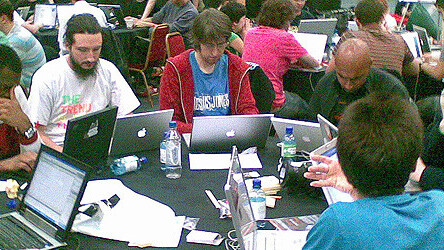
Hack days as a high energy and fun way to get ideas moving are becoming more common as developers, companies and organisations support the method of cross pollinating skills. Organising a hack day is no mean feat and with plenty to plan for, you’re bound to forget something.
Fear not, today sees the publication of the Hack Day Manifesto. It’s a great resource for checking that you will have things in place to help your hack day go swimmingly.
The document states clearly its intention:
So you’re organising a hack day or hackathon?
Here are some basic requirements to make your event a success, and avoid the common pitfalls that could otherwise ruin it. If you cannot provide any of the following, make it clear to guests before registration.
Attendees are generally forgiving when clear communication is given.
The rest of the declaration covers pretty much all of the areas you need to pay attention to for a good event. The venue, including accessibility, location and security are covered along with other site specific tips.
Power and wifi are also discussed, we take for granted that these things will be a part of the day, but that is not always the case. Cristiano Betta of the Geeks of London group helped to flesh out the document with others after Daniel Knell of Artisan of Code brought the topic up in an IRC chat.
Betta says, “The intention was not to make a check list, but we were upset with attending hack days that were forgetting about the basic things. Like proper internet so that people can actually work. We’ve run hack days and we know a lot of other people who run hack days so Daniel made a document and we all added to that. We just hope that it makes sense to others.”
Anyone can add themselves to the document as a supporter of the manifesto and people who agree that they want to run their events by the manifesto. “The list has just been growing,” notes Betta. “There were four when we started and now there are people from all over the UK and from the United States and the Netherlands.”

Work spaces won’t save you
If you are planning a hackathon, you might think it will be an easy ride to book a room at a hack space or venues like Google Campus or Mozilla’s Moz space but that is not a whole solution.
“Those places don’t run an event for you, they provide a space. You still have to cover all of he issues. They will know if the wifi can handle what will happen but an event is much more than just a venue,” says Betta.

The manifesto also covers, food and accommodation, essentials for overnight hacks, APIs and data sets, demonstrations and prizes. An important part of the manifesto is atmosphere and attitude. Any event where a large group of people has to work together may bring up difficulties and the odd character clash. The document lays out some clear ideas on how best to try and handle these things.
Hack days have really started to develop as a fun and interesting activity. They’re great for meeting new people, working out ideas and getting things done in ways that you would never be able to manage alone.
As these event grow and become more common, it’s good to see a clear document like this manifesto being supported by people who have already participated or run a hack day themselves. Definitely worth a read if you’re working in this field and interesting to look at even if you’re not.
Get the TNW newsletter
Get the most important tech news in your inbox each week.





